Dreams and expectations are a little like soap bubbles. From a distance, they are beautiful to look at, but when you get too close, they burst and sting your eyes. Our experience at the Legion was similar. We had gone to the Legion on a quiet, rainy Friday afternoon, expecting to feel welcomed by staff and members alike. We tried our best to fit in – playing pool, darts, and even participating in the meat draw (For your information: we did not win anything), but whilst they were polite, there was an obvious divide between ‘us’ and ‘them’.
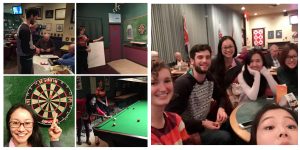 With this ‘outsider’ status, we found it very hard to conduct our research, which we intended to be primarily interview-based. Many members, whilst willing to engage in conversations, were not willing to participate in formal interviews. There were only two staff present, both of whom did not want to participate in our research. The staff did not appear to be aware that the Legion was our community partner either, and when asked about kitchen operations even told Natasha that it was “none of your business” and that she needed to “quit asking”. At that moment, Natasha was shocked speechless. Never before had someone, not to mention a stranger, spoken to her in such a harsh manner, and all Natasha could do was stare, mouth agape, before stammering out an apology.
With this ‘outsider’ status, we found it very hard to conduct our research, which we intended to be primarily interview-based. Many members, whilst willing to engage in conversations, were not willing to participate in formal interviews. There were only two staff present, both of whom did not want to participate in our research. The staff did not appear to be aware that the Legion was our community partner either, and when asked about kitchen operations even told Natasha that it was “none of your business” and that she needed to “quit asking”. At that moment, Natasha was shocked speechless. Never before had someone, not to mention a stranger, spoken to her in such a harsh manner, and all Natasha could do was stare, mouth agape, before stammering out an apology.
Now, we have come to realize the reality of community based research, – it is far from glamorous. People are wary of researchers and outsiders, making us the worst possible combination. As a result, we are faced with the task of redeveloping our research methods, and possibly our objectives. With so few staff and members willing to be interviewed, it is likely we are going to have to rely on our observations of Legion activity and casual conversations with members instead. Since the staff were unwilling to disclose any information, we will likely be unable to assess kitchen infrastructure and can only analyze the community food-related programs offered at the Legion.
Objectives + Achievements
To learn more about what we accomplished in weeks 1-6, check out our previous posts!
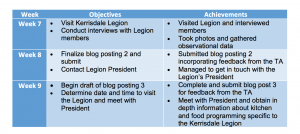
Moments of Significant Change
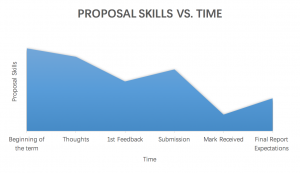 Proposal:
Proposal:
Initially, our group was much more confident about our proposal skills than we had any right to be. We were all inexperienced in this area, but believed that the task we had been presented with was manageable. However, we slowly realized the magnitude of our inexperience – we weren’t sure just how much detail was expected, what each section should include and the difference between objectives and inquiry questions. After receiving feedback from our TA Colin, we realized that we had embarked onto a train that was going in the wrong direction. We tried to rectify this, and put quite a bit of time and effort into our final draft, which we were felt was a good attempt for our first ever proposal. The grades we received however, tanked this confidence. After reviewing our feedback and completing some of other written assignments, our confidence regarding proposal writing has now begun to slowly rise again.
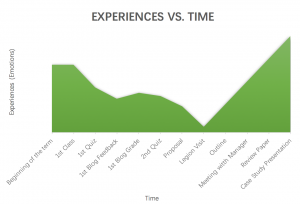
Emotions:
At the start of the semester, we were eager to learn and analyze the connections between food, health, and the environment using a food justice perspective. However, after the first class, we found some of the concepts introduced to be quite challenging and did not completely understand terms, such as “food justice” and “food sovereignty”. As a result, we began to doubt whether we would do well in this course. This lack of confidence increased after our first quiz. Although we had all done the required readings in preparation, we still scored poorly. After receiving low scores in both our first quiz and proposal, we really wanted to improve our grades, so we tried to maintain a positive mindset and write a high quality first blog post. Upon submission, we were very anxious – our TA seemed like a hard marker and we really wanted to impress him. Combined with it being midterm season and the constant stream of assignments, all of us were quite on edge.
Our first Legion visit was very difficult. We felt like outsiders, the staff and customers were reluctant to answer our questions, and we were denied access to the kitchen. That day we walked away with very little information and quite a bit of disappointment, but we knew we had to keep going. Thus, we contacted the Kerrisdale Legion president, Sid Harrison, and set up a formal meeting on November 4th. Sid’s friendly demeanor and willingness to answer our questions has given us hope that we can tackle this project. We will try our best to stay positive despite the difficult obstacles we face, and continue to work together to end this semester on a good note.
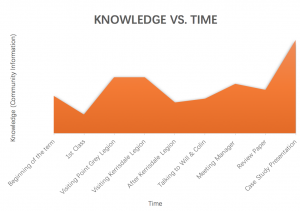
Knowledge:
At the beginning of the term, we thought we had a good idea about what our community project would entail, based on what we had heard from friends who had taken the course previously. However, after our first class, we weren’t quite sure what was expected of our project in particular and just how we would go about assessing the Legion. Luckily, the visit to the Point Grey Legion provided us with some much needed background information about Legion history and operation.
However, with our rocky start at the Kerrisdale Legion, we felt that we would not be able to gather sufficient data to complete our project. Immediately, we consulted Will and Colin and their advice has definitely helped us find other ways to go about our research and how we can present our findings. We have also set up a meeting with the president of the Kerrisdale Legion for November 4th. Hopefully, he will be able to answer our questions and provide us with sufficient information to complete our final report and presentation.
The research we have completed individually for our academic and experiential review paper has illustrated to our limited knowledge of food justice issues in Canada. Hopefully we will all have a better understanding of our respective issues after completing our papers.
Strategies for Successful Project Completion
As we finish data collection, we need to start thinking about our final report and infographic. In order to do so, we must interpret and evaluate the data to discern what assets the Legion possesses, as we will be utilizing asset-based community development. We will first determine which attributes of the Legion are valuable to the Vancouver Food Strategy and continue analyzing from there. Once completed, we will delegate aspects of the final report and project amongst our group members to ensure an equal distribution of the workload. In order to make sure we are on task we will continue to meet up and communicate through Facebook and email. The course learning objectives will be used as guidelines for our assignments in the coming weeks, and we will do our best to adhere to them.
After our difficult first visit to the Legion, we are hoping that the meeting with the President will provide us with the assets needed to complete our asset-based community development project. Although things didn’t go according to plan originally, it has provided us with the opportunity to approach our problems with a revised and creative mindset. Hopefully this new mindset will translate into a more insightful final product.